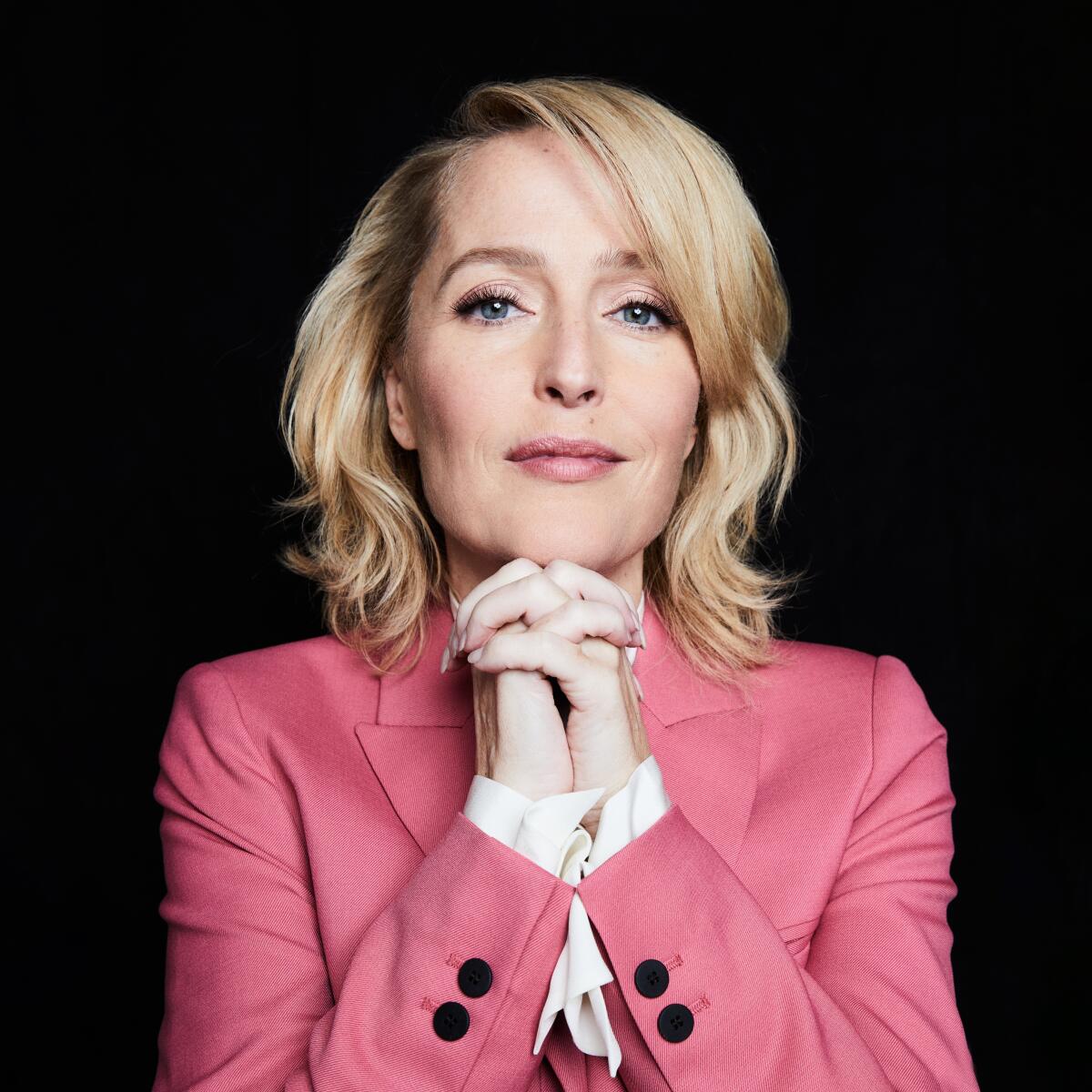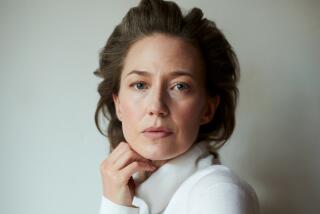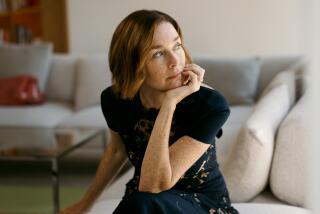Why ‘The Crown’ star Gillian Anderson is probably not the hard-ass you think she is

“What do you think people would be most surprised to find out about you?”
Gillian Anderson used to get asked this cliched question all the time and she would offer the same response: That I am a complete goofball. Nobody believed her. It was as if she was trying to hurl this kooky energy out into the universe but all anyone could see was the woman who played the rational Agent Dana Scully over the course of 218 episodes on “The X-Files,” the skeptic who never wavered from the view that extraordinary things could always be explained in the most mundane fashion. Forget your flights of fancy. It’s all nonsense.
So Anderson just kept on being her authentic self. She took to Instagram, posting pictures that playfully suggest genitalia with the hashtags #penisoftheday and #yonioftheday. She didn’t do this every day, mind you, just often enough to put across the idea that ... hmmm ... she’s a little bit naughty. And funny.
After she was cast as starched British Prime Minister Margaret Thatcher on the fourth season of “The Crown,” Anderson started to post pictures from the set, where, helmet hair lacquered into place, she’d be doing very un-Thatcher-like things, like kicking back in Queen Elizabeth’s monarch chair with her feet up on Prince Philip’s matching seat. Or making silly faces with the queen herself, Olivia Colman.
“I think I’ve lightened up,” Anderson says, smiling, from her London home during a recent video call. “I figured out somewhere in my late 40s how to be an interview subject without carrying the world on my shoulders.”
That said, Anderson does admit that she still dreads interviews and can come across as someone who makes people a little nervous. The latter admission arrives as a bit of knowing self-deprecation as she talks about the challenges of playing Eleanor Roosevelt in an upcoming Showtime limited series about White House first ladies. Anderson marvels at how much Roosevelt was loved from the beginning of her public life.
“She always put people at ease,” Anderson says, “so it’ll be interesting to dive into that.” Perhaps develop that aspect of yourself? I ask. “Maybe.” Or ... reveal it, like her silly side? “Yes!” she says, without hesitation.
“Gillian never shies away from challenges,” says longtime friend Michael Barker, co-president of Sony Pictures Classics, the studio that released the 2000 adaptation of the Edith Wharton novel “The House of Mirth,” a movie Anderson describes as a “really big deal” for her career. Barker says she carried the film, which came at a time when Anderson was having a hard time landing good roles outside of “The X-Files.”
Finding satisfying work has not been an issue of late, though the pandemic paused everything after she wrapped “The Crown” last February. Anderson resides in London with her two sons, who are 14 and 12. She cops to being “quite a hermit,” so the lockdown didn’t faze her much. She painted walls, listened to podcasts, did innumerable puzzles. She couldn’t quite shake Thatcher early on, finding she’d revert to “Thatcher face” when concentrating on solving a puzzle.
Asked to explain “Thatcher face,” Anderson gleefully adopts the slow, breathy enunciation she used to play the prime minister on “The Crown.”
“If I were to be talking to you about what we were discussing today,” she begins, and I’m not really listening because I’m laughing so hard, “I would probably say — and you can’t really see it — but she really leads with the teeth and so it’s more that her teeth are very, very prominent.”
The disconnect between the formidable Iron Lady voice and the radiant woman on my screen is jarring in, yes, the nuttiest possible manner. Anderson rattles off the many aspects of Thatcher’s voice, some of which she didn’t get to play, like the way she would hector foes “in the manner that only she could.”
It sounds like she regretted not having a good hectoring scene. Anderson notes that she did actually get to use her bully voice once, in the fifth episode in which an Englishman breaks into the palace and asks the queen to save the country. In the background, you can hear Thatcher doing a news interview. “She’s very worked up and her voice is going all over the place as she’s trying to talk about the economy and not mollycoddling the public, which is one of her favorite topics,” Anderson says. Regrettably, she does not demonstrate.
When Anderson did return to work last year, it was to shoot the third season of “Sex Education,” the frank, funny British TV series, also available on Netflix, that has her playing Jean, a sex therapist who has boundary issues dealing with her teenage son. The series is something of a small miracle — an angst-free look at sex that’s both light and sensitive. Anderson worried that the show’s complicated tone would be tough to replicate when filming in the midst of a pandemic and social protests.
“Taking the liberty and showing all the messy, awkward, inappropriate teenage foibles and adult mistakes and f—ups in the wake of where we were felt bizarre,” she says. “It was a weird environment to be laughing and joking about any old thing.”
Anderson’s boys were younger when she was offered the part of Jean. The part could be a true showcase of her comedic confidence, but she had a “litany” of concerns. “I was worried about them feeling embarrassed by the fact that A) I was on a show about sex, B) that I played a sex therapist, C) that I spoke about these things, D) that I had sex on the show,” Anderson says, ticking them off.
The first episode literally has a scene in which Jean’s son’s schoolmates discover a sex ed video featuring her and show it in his classroom, much to his horror. That scene rattled around Anderson’s brain, though her sons did sign off, understanding why she wanted to do the series. And they now consider her — maybe this is overstating it, Anderson says — “cooler” for taking the part. Not that she knows if they’ve actually watched. (She kind of hopes they haven’t.)
One show they definitely haven’t seen is “The X-Files,” though she imagines that, at some point in their lives, a friend or co-worker or partner will introduce them to it. “And then they’ll have a nice surprise,” she says, brightly. “Or even if they don’t end up seeing it until after I’ve passed, that will be a lovely thing for them. They’ve got, what, 21`2 episodes [218, but who’s counting?] of their mom to watch. That’s a lovely gift.”
She’s laughing. And I’m laughing because, wow, I feel like we’ve taken a dark turn here with this talk of mortality.
“Noooo, that’s a bright turn,” she says. “I thought about that recently. Somebody sent me a picture where I look a lot like my daughter [Piper, 26] as young Scully. And I showed it to one of my sons and thought that must be such a strange thing. To go back and see an element of a parent that so many people around the world have been exposed to, I mean, in-depth, and not know it or understand it and then to dip into it and see hours and hours and hours of your younger parent in all these bizarre situations.” The thought strikes her as ... goofy.
More to Read
From the Oscars to the Emmys.
Get the Envelope newsletter for exclusive awards season coverage, behind-the-scenes stories from the Envelope podcast and columnist Glenn Whipp’s must-read analysis.
You may occasionally receive promotional content from the Los Angeles Times.










